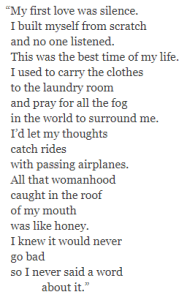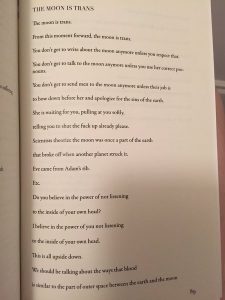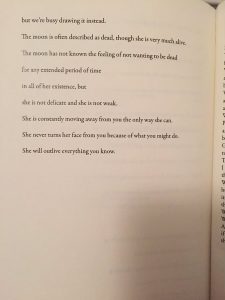

“My First Love” by Joshua Jennifer Espinoza

The poem “My First Love” by the transgender poet, Joshua Jennifer Espinoza, alludes to the feeling of discomfort felt by transgender people prior to gender transition. Espinoza writes, “My first love was silence.” (1) to describe the state of her youth in which she refrained from expressing her natural thoughts and feelings of womanhood. The silence that she mentions stems from her fear of the rejection, discrimination, violence, bullying, stigma and restrictive gender norms that transgender people face (Shuster and Wesbrook, 2). Espinoza explains that she used to carry women’s clothes to the laundry room and pray that fog would keep her hidden from the public eye (5-8). As a young man carrying women’s clothing, she wanted to stay hidden to avoid the discrimination and bullying faced by transgender individuals.
Espinoza describes “All that womanhood/ caught in the roof/ of my mouth/ was like honey.” (12-15) Even prior to her transition, Espinoza was aware of the womanhood permanently rooted within her. She writes, “I knew it would never/ go bad” (16-17) to refer to the strong foundation of womanhood within her. Espinoza knew she was destined to transition to become a woman, she knew her womanhood would persist. But because of the oppression endered by the marginalized transgender community, prior to her transition Espinoza “…never said a word/ about it.” (18-19).
Espinoza’s awareness that her womanhood within would never leave her foreshadows the transjoy she would experience upon transitioning to become a woman. From the silence she loved and grew used to, she would eventually be able to speak openly about her womanhood as she does today through poetry. After transitioning, Espinoza would no longer have to basque in silence, fighting for her own self-definition of her existence. Her transition would establish a noticeably stronger foundation on which she can thrive. Her transition allows her to find inner peace and pleasure in the empowering inhabitance of her body based on her own self-definition.
“The Moon is Trans” by Joshua Jennifer Espinoza


Joshua Jennifer Espinoza’s poem, “The Moon is Trans” portrays the boosted self-confidence and inner peace felt by an individual after transitioning. Espinoza explains, “From this moment forward, the moon is trans.” From that moment forward, the newly transitioned moon demands respect. A writer is prohibited from writing about the moon unless they respect the moon and use her pronouns. The moon is experiencing the transjoy one feels after coming out or transitioning. The moon is significantly happier now that she has embraced her marginalized identity.
Contrary to the dominant narrative of shame that is brought with being from a marginalized group, trans peoples’ quality of life significantly once they have embraced themselves as trans. Trans people are able to experience positive marginality through an increase in their self-confidence as they feel more comfortable with themselves. As explained by Jax, a trans interviewee in a study on joy, “…my foundation was cut into so many pieces but now I have at least a large slab of who I am” (Shuster and Westbrook, 10). The moon now has a deeper self-knowledge which brings a sense of empowerment.
Espinoza uncovers the ways in which society’s view of the marginalized trans community is wrong. She wants to talk about the ways in which blood represents the area of outer space between the earth and the moon. Espinoza illustrates the regularity and commonality of the trans moon and depicts the trans moon and the earth to be one whole being. She points out the common description of the moon as dead, society’s narrative that trans people are miserable in their existence. Espinoza explains that the moon “…is very much alive./ The moon has not known the feeling of wanting to be dead/ for any extended period of time/ in all of her existence, but/ she is not delicate and she is not weak” (20-24) The moon’s description of being lively emphasizes the value of empowering marginalized individuals to live in their bodies in accordance to their self-definitions. Espinoza tells that the moon has never wanted to be dead “for any extended period of time” because the moon has gone through hardship and trauma through the stigmatism and bullying endured by trans people, but the moons transition has empowered her to feel joy through the ability to question the world around her which has enabled personal growth and positive social change.
At the end of her poem, Espinoza declares that the moon is constantly moving away from you, from the negative energy that society directs at the marginalized trans community. The moon will never turn her face from you because of the terrible things that society may do to her when she is not looking. Although she is happier now that she has transitioned, the society’s threats still linger. Espinoza concludes with the final statement that “She will outlive everything you know.” (28) The moon is wiser than society will ever know because she has gained multiple perspectives throughout her existence in her journey to become fully self-knowledgeable.